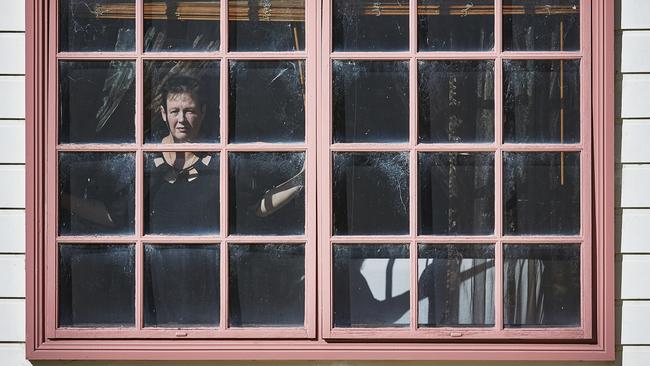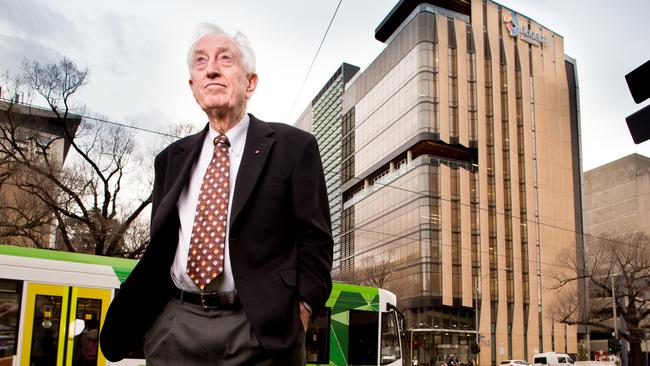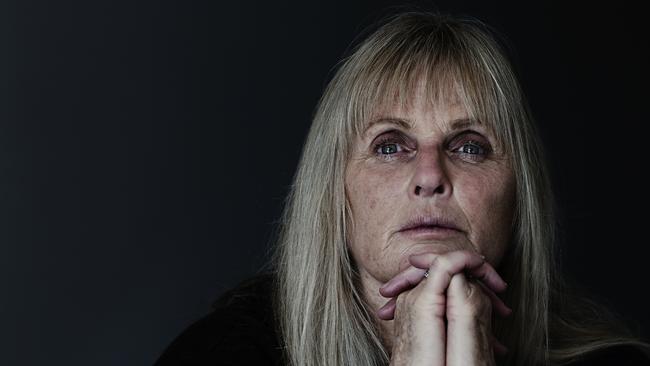Covid-19’s painful, lingering legacy
A growing ‘phantom army’ of Covid-19 patients are plagued by mysterious symptoms months after the virus has left their body. Why?

There’s just one thing Julie Lamrock must do right now and that is breathe. Keep gulping down that pure, bright air no matter how much it hurts. Drill down past the job she lost, the mortgage she deferred, the lost months sleeping 22 hours a day, the house she stopped renovating, the friends she stopped seeing. Just breathe. Push past the thrumming pain and the exhaustion that pumps through every branching capillary, weighing down her limbs and pinning her to the couch in her Hazelbrook, Blue Mountains, home.
She’s gasping now, pulling air into her lungs with her entire body, as she details the symptoms that plague her five months after she first tested positive for Covid-19. Her feet and hands are swollen; she can’t wear any of her rings. She’ll intermittently burn with fever, shiver with chills. Nerve endings jangle. Her hair is thinning. Sudden jolts that feel like electric shocks spike her left side. Her face hurts: her teeth, her jaw, the glands behind her ears, the crown of her head. “If I wash my hair I can feel the veins hurting,” she says. Lamrock, 54, has regained only half her sense of smell, 25 per cent of her taste. Brain fog has her constantly grasping for words, chasing after thoughts that dissolve like morning mist.
“But mainly it’s the pain in my chest and the breathing,” she says. “My husband has to help me put my bra on, and even his knuckles doing up the clips, if they touch the back of my ribs it feels like someone’s stabbing me. I want people out there to know how bad this disease can be.”
Lamrock is what’s known as a long-hauler, part of a phantom army of Covid-19 patients who continue to suffer long after the virus has left their body. While emphasis in the pandemic’s early stages understandably focused on the acute phase, on the hospitalisations and deaths, evidence is mounting that the coronavirus that has up-ended our lives can cause more than a transient respiratory disease.
“It’s quite an insidious virus in that it does leave its footprint,” says University of Queensland virologist Ian Mackay. “As we’ve learnt more about it, we’re finding it’s not just ‘death or everything’s fine’. There’s this developing theory now that the long-term consequences are significant and it’s yet another reason to take this virus very seriously.”
The received wisdom has been that the coronavirus kills about 1 per cent of those infected, mostly the elderly and frail, and that the remaining 99 per cent recover after an average of two weeks. But there is a growing chorus of people like Lamrock who report debilitating maladies that drag on for months. Young and formerly healthy people, many of whom had only a mild case of Covid-19, describe a medley of lasting symptoms: chest pains, extreme fatigue, headaches, shortness of breath, diarrhoea, joint and muscle pain, tingling fingertips, racing heartbeat, hair loss, foggy thinking, persistent loss of taste and smell. “It’s like an alien has taken over your body,” says Rachel Visocchi, a 40-year-old Sydney healthcare worker who had to quit her job after three months of debilitating post-Covid symptoms. “You wake up wondering what today’s crazy new symptom will be.”
The coronavirus enters the cells of those infected through a gateway called the ACE2 receptor, found in organs throughout the body. Early research suggests it travels through the bloodstream, and clinicians are seeing evidence that, beyond the damage it wreaks on the lungs, the virus also may be causing heart inflammation, acute kidney disease, strokes, seizures, blood clots, intestinal damage and liver problems.

“We all started off thinking about this more or less like influenza,” says Australia’s Nobel prize-winning immunologist Professor Peter Doherty. “But what has gradually emerged is that it’s also a vascular disease [and] it’s getting around the body. We have absolutely no understanding of the possible long-term health impacts, but we do know that death is not the only outcome to fear.”
Until recently, Covid long-haulers felt they were shouting into the void, their symptoms dismissed as psychosomatic or a result of anxiety. They formed online communities to compare notes: Facebook groups such as Long Haul Covid Fighters, Long Covid Support Group and the formidable Body Politic COVID-19 Support Group, which conducted its own “patient-led research for Covid-19”, an informal survey of 640 members that unearthed a bewildering array of systemic long-term impacts.
These groups have been dominated by people from harder-hit countries such as the US, UK and much of Europe. But as Australia moves into its seventh month of living with the virus, our own phantom army is raising its voice.
Lamrock calls her medical purgatory The Aftermath and she says it’s a lonely place. “My doctor did all the right things in the beginning but now I feel like he can’t do anything for me,” she says. A self-employed shuttle driver, Lamrock hasn’t been behind the wheel since coming down with Covid symptoms days after taking an infected Ruby Princess passenger from Circular Quay to Campbelltown, in western Sydney, on March 19. Her world has narrowed; she shuttles now between her bedroom and the lounge, where stained glass windows filter a weak winter sun. A white cloud of toy poodle jumps onto her lap and she winces. “The doctors’ answer is to take painkillers,” she says, “so I’m living on [the opioid] Endone just to do things. I’ve got so many problems it’s not funny.”

When Brisbane lawyer Debbie Kilroy read about British academic Paul Garner’s Covid-19 experience, she burst into tears. “It was such a relief,” she says. “I thought, ‘Oh my God, that’s what this is!’” Garner, a professor of infectious diseases in Liverpool, documented his non-recovery from a bout of the virus in vivid terms for the British Medical Journal: “For seven weeks I have been through a rollercoaster of ill health, extreme emotions and utter exhaustion,” he wrote.
Kilroy felt validated seeing a respected professional acknowledge the prolonged effects of the disease, outlining “weird as hell” symptoms such as a muggy head, upset stomach, tinnitus, pins and needles, breathlessness and dizziness.
In July, another medical professional, 50-year-old Sydney GP Warren Lee, brought further attention to long Covid by sharing his harrowing experience in a Facebook post. Lee, a fit and healthy cyclist diagnosed in April, said he had been left with myocarditis (an inflammation of the heart muscle) and new onset epilepsy. Four months on, Lee said he was “no longer allowed to ride a bicycle. I am not allowed to drive a car. I’m on medication now.”
Kilroy, 59, is the founder of Sisters Inside and an advocate for the human rights of women in the criminal justice system. In mid-March, she and activist Boneta-Marie Mabo, Eddie Mabo’s granddaughter, returned from a work trip to New York. On the flight over they’d sat two seats behind Home Affairs Minister Peter Dutton, who later tested positive for Covid-19. On March 16, they also tested positive.
Kilroy spent 23 days in self-isolation before being cleared of the infection; bizarrely, she would continue to test positive for 104 days. “The doctors equated it to digging up a mummy from under the ground,” she says. “The mummy would still have traces of DNA but it’s dead; I had traces of a dead virus but I wasn’t infectious.”
She may not have been infectious, but Kilroy felt like hell. “For the first month after coming out of isolation, I thought I was going mad,” she says, still obviously labouring to breathe. “I kept thinking, ‘What is wrong with me?’ I’m always fit and healthy, I go to the gym all the time, but I just had no energy and I felt so sick.”
Kilroy says she had no flu-like symptoms or fever when infectious, but developed chest pains later. “My chest is really tight now; I’m on steroids to try and free it up,” she says. She also suffers from headaches, body aches, extreme fatigue and “it’s hit my nervous system”, she says. “If there’s some external stress, I can feel my whole body shake, like brrrrrr.” She’s had blood tests, CT scans and an echocardiogram “to try and see what’s going on. I didn’t even think it was Covid-related because no one said there would be ongoing health concerns. It was all about either you live or you die, so if you live you’re supposed to get on living.”
Anecdotal stories abound. But, with the SARS-CoV-2 virus so new, hard data about long-haulers is scarce, giving their experiences an air of unreality when judged against the daily updates about case numbers and deaths.
The world’s scientists are just beginning to probe the scope and duration of the harm that the virus, or the body’s response to it, can inflict. There are still so many questions. Why are some people asymptomatic while others end up on ventilators? Why are children less exposed? How can someone test positive for 104 days? Can you get the virus again? And, most urgent for the Covid long-haulers, how long does this last?
A handful of formal overseas studies have focused on the lingering effects of the virus. In a small Italian study published in the international peer-reviewed Journal of the American Medical Association, 87 per cent of patients who had “recovered” from the disease after hospitalisation reported at least one ongoing symptom, mostly fatigue, breathlessness, joint or chest pain. A German study of Covid patients found that 78 per cent had heart abnormalities two or three months after recovering from the virus. Another, published in the European Heart Journal, examined more than 1200 patients hospitalised with Covid-19 in 69 countries, and found that 46 per cent of previously healthy patients had long-term damage to their heart. And experts now believe that as many as one in three patients could suffer neurological or psychological after-effects, according to US health news website STAT.
There is no research data from Australia yet, reflecting the disease’s relatively low prevalence here, but “there’s chatter among doctors, certainly, about some people experiencing persistent symptoms,” says Professor Peter Wark, a respiratory specialist at John Hunter Hospital, Newcastle, who is studying how Covid-19 affects the immune system. He says it’s “extremely unlikely” long-haulers are dealing with a persistently replicating virus; rather, “this is a phenomenon triggered by the acute episode and the immune response”.
People with severe Covid-19 have been shown tosuffer a “cytokine storm”, an exaggerated inflammatory response that attacks the body causing severe damage. But even mild cases can take weeks or months to recover, leading some experts to speculate that what long-haulers call “long Covid” may be a variation of “post-viral syndrome”. Dr Anthony Fauci, the United States’ top infectious diseases official, observed in July that an “extraordinary” number of Covid survivors had developed symptoms “strikingly similar” to chronic fatigue syndrome/myalgic encephalomyelitis (CFS/ME), an enigmatic illness that has baffled the medical fraternity for decades.
The concept of a post-viral illness is not new: medical literature surrounding the 1918 influenza pandemic talks about a subsequent worldwide outbreak of encephalitis lethargica, a condition made famous by the 1990 Robin Williams film Awakenings. “It was never directly linked to influenza,” says Wark, “but there was an enormous implication that the pandemic was also associated with the development of this Parkinson’s disease- type problem.”
Influenza has long been linked to persistent symptoms such as fatigue and muscle pain, but “Covid seems to behave differently”, says Associate Professor Louis Irving, director of respiratory and sleep medicine at Royal Melbourne Hospital. “I’m seeing people who continue to have respiratory symptoms six to eight weeks post-infection, some 12 weeks. These are people who haven’t been in intensive care, some haven’t even been admitted to hospital, but they still have a cough, breathlessness, they can’t exercise.
“I’ve been in respiratory medicine for 30 years and this is occurring more than it would in standard seasonal influenza or with pandemic influenza. It’s anecdotal but it’s noticeable.”
Like influenza and other severe respiratory viruses, Covid-19 causes inflammation and scarring in the lungs, but it also causes blood clots “and this could be another pathogenic mechanism for the ongoing symptoms,” Irving says. “There’s so much we don’t know.”
The fact that long-haulers exist “changes the conversation”, Wark says. “All of us have, rightly, been very tied up with the initial illness … but the danger is we’ve now been left with a big problem. A large number of people have become infected and if there are consequences of this illness, it’s going to be with us for much longer than the acute phase.”
The medical term for shortness of breath is dyspnea, sometimes described as “air hunger”. To Rachel Visocchi, at her lowest point, it felt closer to starvation. “I’m very healthy, never smoked, never had any respiratory issues in my life,” she says. But in early April, as Australia recorded its 50th Covid-19 death, she found herself isolating at home, separated from her partner and three children, convinced she was about to take her last breath. “It was terrifying,” she says. “I’d be lying in bed at night trying to get to sleep thinking, ‘What if I don’t wake up? What if I’m not able to breathe?’ I was making little videos on my phone because I thought, if something does happen to me and I don’t wake up, I want people to know how much I was struggling to breathe. It was one of the scariest, loneliest times of my life.”
But, she says, The Aftermath came a close second. For three months post-infection she suffered. Stabbing pains in her eyes. Body aches: “Like period pain but all over your body.” Fingers and toes constantly freezing. Headaches: “Like migraines, every single morning.” Fatigue: “Waking up feeling like you’ve been hit by a truck.” Her sense of smell and taste completely disappeared, “like someone flicked a switch. Friends would drop off cooked meals at my door, even things with chilli in them, and I couldn’t taste a thing.” Brain fog? Yes. “I really did feel like I was very forgetful, I couldn’t concentrate. Everything felt like it had gone slow. And just putting my hands above my head, even just washing my hair or hanging out washing, I’d start feeling like I couldn’t breathe, like I’d run a marathon. My heart would be racing.”
As a healthcare worker, Visocchi was required to get a flu shot before going back to work “but with how rotten my body was feeling, I thought, ‘I’m not going to inject another something into it’.” She ended up having to resign.
Visocchi says she can’t fault the care she received while isolating at home under the care of western Sydney’s Nepean Hospital. But, after three weeks and two negative swabs, “I was still just so unwell”. Yet, “every doctor I spoke to at the hospital said, ‘You’re clear now, just go about your life’. They could see I was struggling to breathe but no one knew anything and no one wanted to give me the time of day. It’s awesome while you’re sick but once I was released as a negative case, all the care stopped.”
Visocchi was beginning to despair when she saw a news report about a study being conducted in Sydney. In April, researchers at St Vincent’s Hospital and UNSW’s Kirby Institute launched ADAPT, Australia’s first comprehensive, longitudinal study of more than 100 recovered Covid-19 cases, both mild and severe. The majority of the initial cohort was diagnosed through St Vincent’s clinics; 15 are, like Visocchi, self-referred. It’s early days – the plan is to track patients for 12 months – but researchers report that, more than three months post-infection, about 20 per cent of patients are still reporting symptoms.
“Fatigue, exercise intolerance, brain fog, chest heaviness; some have heart palpitations and some have difficulty getting their breath,” says study leader Professor Gregory Dore, an infectious diseases physician at St Vincent’s. “That’s a package of symptoms that’s pretty common among the group that has this post-Covid illness.”
Dore says it’s crucial the long-haulers are not dismissed. “There are so many layers of uncertainty around this disease and it’s no wonder people are anxious,” he says. “But this is not just a psychological anxiety disorder at all,” he adds. “You wouldn’t have thousands and thousands of people on chat groups internationally if there wasn’t something going on. Hopefully our research will give us some understanding of what the triggers of these ongoing symptoms are.”
A number of different hypotheses are in play. “One is that the virus causes significant damage in the acute infection phase to various organs outside of the lungs, and that damage takes some time to resolve,” Dore says. “The other hypothesis to explore is whether the viral infection triggers an abnormal immune response.”
Visocchi says the study has been a godsend: “I’ve been able to have all these tests and scans and find out where my body is at.” Cleared of any permanent damage to her lungs, she finally noticed an improvement 12 weeks after first testing positive. “My headaches started to go, my body aches got better,” she says. “I still have little things, like freezing cold hands and the sharp pain behind my eyeballs, that make me go, ‘It’s still there’. But I’m grateful to be alive, grateful to be breathing.”
Dore says: “In a funny way, I think the involvement in the study is a bit of an intervention in itself. People feel they are being taken seriously, they are being investigated thoroughly, and they’re giving back in terms of helping us understand the disease that they have.”
Dore has been involved in clinical and research work in the Hepatitis C sector for 20 years and has seen his share of stigmatised patients. He confesses to being nonplussed by the stigma around Covid-19 patients, many of whom were reluctant to be identified for this story. “Why would people feel a stigma in terms of a disease which is not related to their lifestyle, something that’s affecting people broadly in the community?” he wonders. He can only put it down to “the whole experience of being put into isolation and being anxious about spreading the infection to others”.

Graham Paget just wanted to see the penguins. The 76-year-old retired surgeon and Rosemary, his wife of 24 years, had been planning a trip aboard Antarctic cruise ship MV Greg Mortimer for 12 months. On March 15, they set sail from Ushuaia, Argentina, and though they filled a camera memory card with seals and whales and icebergs and penguins, Rosemary, 75, nearly paid for the adventure with her life.
A week into the Antarctic trip, passengers aboard the Greg Mortimer were told that the Covid-19 sweeping the globe had caught up with the ship. Ports were closing. A passenger fell ill on March 22 and by late March, the ship was stranded in the port of Montevideo, where the Uruguayan authorities insisted everyone be tested for Covid-19. Graham and Rosemary were both positive. While Graham remained asymptomatic, Rosemary – who was on medication for hypertension and had mild emphysema but was otherwise fit – soon developed an irritating cough and a slight temperature. She was offloaded to the British Hospital in Montevideo on April 3. “Four days later I got a call that she had deteriorated and had been shifted to ICU,” Graham says. His wife had been put into an induced coma and was on a respirator. “It was quite a shock.”
The shocks kept coming. A week later Rosemary went into complete renal failure and was put on a dialysis machine; the virus also attacked her small intestine, causing an internal haemorrhage requiring blood transfusions. She was intubated for so long, she eventually had to undergo a tracheostomy. “I freely admit I had the thought of having to contact an undertaker in Montevideo several times,” Graham says.
Rosemary ended up spending three months in intensive care, more than a month of that on a ventilator, before being medevaced to Fiona Stanley Hospital in Perth, WA, where she regained full consciousness for the first time.
Macquarie University respiratory physician Professor Alvin Ing was on the Greg Mortimer when Covid-19 struck; five months on, he is still treating a number of the most severe cases at his Sydney clinic. He recalls Rosemary Paget being one of eight passengers evacuated from the ship to ICU in Montevideo and says every one of those intubated has ongoing complications.
“For whatever reason, and obviously we don’t understand it yet, the SARS-CoV-2 virus does cause long-term issues,” he says. “Respiratory-wise, pulmonary fibrosis is probably the biggest concern but I’m seeing long-term cardiac conditions as well, such as arrhythmias and cardiomyopathies,” he says. “These things can take some time to get over or you may never get over it.”
When I talk to Graham in late August, Rosemary is still in the rehabilitation ward at Fiona Stanley Hospital, still on dialysis but finally breathing on her own. She has just taken her first, halting steps with the aid of a walking frame. Five months after setting off to see the penguins of Antarctica, the Pagets can finally contemplate heading home to their 48ha cattle farm in Denmark, on WA’s south coast. Rosemary is even cautiously optimistic that, with ongoing physiotherapy, she’ll one day be well enough to resume the weekly line-dancing, golf and gym sessions she enjoyed pre-Covid.
“Boy, it’s been a long haul,” Graham says, with a catch in his voice. “I still get a bit teary when I try to imagine what she’s been through. Even surviving it, you don’t get off lightly.”


To join the conversation, please log in. Don't have an account? Register
Join the conversation, you are commenting as Logout